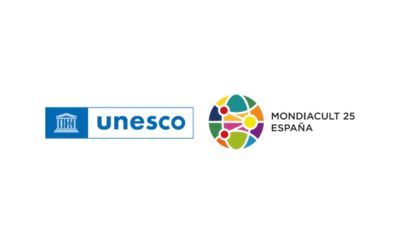ICOMOS at MONDIACULT 2025: A Global Voice for Cultural Heritage and Sustainable Development

As preparations for MONDIACULT 2025 in Barcelona advance, ICOMOS again works to advocate for cultural heritage as a cornerstone of sustainable development. Through UNESCO-led regional consultations (November 2024 and February 2025), ICOMOS experts provided insights on key themes, including culture as a stand-alone goal, climate action, heritage in crises, indigenous knowledge, and the ethical technology use.
Represented by regional Vice Presidents, members of the ICOMOS Sustainable Development Working Group (SDGWG), and emerging professionals, ICOMOS helped position heritage protection at the heart of this global cultural policy discussion, shaping critical dialogues on cultural rights, resilience, and the future of cultural governance. SDGWG Focal Point, Naima Benkari, coordinated participation across regions to ensure a cohesive approach.
Culture as a Goal: A Call for Recognition
ICOMOS emphasized the need for culture to be recognized through a stand-alone goal in the post-2030 UN Agenda. Experts highlighted its vital role in urban resilience, social cohesion, and economic development. Regional perspectives included the Latin America and Caribbean region focus on the indigenous concept of Buen Vivir (Good Living), which promotes a non-anthropocentric, harmonious relationship between culture and nature, and the European and North American region's call to institutionalize cultural heritage as a human right.
Decades of experience have shown that excluding culture from the SDGs has hindered sustainable development. ICOMOS advocates for integrating heritage into policy and planning, with culture as a key driver of sustainability and not merely an afterthought.
Heritage and Climate Action: A Scientific and Policy Imperative
Building on its 2020 Climate and Ecological Emergency declaration, ICOMOS advocated for heritage-based climate adaptation. Experts highlighted risks to sites such as Lamu Old Town (Kenya) and Twyfelfontein (Namibia) and the threat of rising sea levels to entire Pacific cultural landscapes.
ICOMOS’ Climate Adaptation Toolkit was put forward as a resource for practical guidance, while during the European and North American consultations ICOMOS emphasized sustainable urban development, advocating for the renovation and adaptive reuse of heritage buildings over demolition.
Heritage in Crises: The Role of Culture in Recovery
ICOMOS has been at the forefront of safeguarding heritage during times of crisis. Regional consultations addressed heritage destruction from conflicts, displacement, and disasters, highlighting the cultural devastation in Palestine and the urgent need for international collaboration to protect vulnerable sites; the role of traditional knowledge in disaster resilience in Asia-Pacific, ensuring local communities retain agency in recovery, and ICOMOS' support for Ukrainian heritage.
A key takeaway was the need for culturally informed recovery. ICOMOS continues to advocate for integrating heritage into humanitarian responses to preserve historical and cultural identities during reconstruction.
New Technologies: A Double-Edged Sword for Heritage
Discussions centered on the potential and risks of digital technologies. ICOMOS emphasized ethical digitization, to prevent the exploitation of Indigenous knowledge, intangible heritage, and traditional practices by AI-driven algorithms. The Arab States raised concerns over digital access disparities while Asia-Pacific and Latin America highlighted the risks of unauthorized reproduction of cultural artifacts undermining local artisans and Indigenous crafts and the need for digital sovereignty policies that protect cultural data from misrepresentation.
While digital tools can enhance access, documentation, and heritage management, ICOMOS underlined they must be regulated to prevent cultural erasure and exploitation.
Looking ahead to MONDIACULT 2025
Through its SDG Working Group, as well as its Climate Action Working Group and International Scientific Committees, ICOMOS will leverage its global professional expertise to keep heritage, and the pressing challenges it faces, central to MONDIACULT 2025 discussions and side events in the coming months.
Leading up to the conference, key priorities include:
- Advancing the case for a stand-alone culture goal in the post-2030 UN agenda.
- Promoting climate-adaptive heritage practices through research and advocacy.
ICOMOS Contributors by Region:
The following played a key role in the regional consultations, under the coordination of Naima Benkari, SDGWG Focal Point:
Africa:
- Chilangwa Chaiwa (ICOMOS Vice-President, Africa Region)
- Laura Robinson (ICOMOS-RBA-WG)
- Tokie Laotan (ICOMOS-SDGWG-ISCCL)
- Ishanlosen Odiaua (ICOMOS Advisory Committee)
- Tsholofelo Goabaone Kenathetswe (ICOMOS-EP)
- Zuhura Mtenguzi (ICOMOS-EP)
Arab States:
- HRH Princess Dana Firas (ICOMOS Vice-President, Arab Region)
- Khaled Harrouni (ICOMOS-SDGWG)
- Naima Benkari (SDGWG Focal Point)
- Bayan Al-Faouri (ICOMOS-SDGWG)
- Iman Al-Asi (ICOMOS-SDGWG)
Asia-Pacific:
- Susan McIntyre-Tamwoy (ICOMOS Vice-President, Asia-Pacific)
- Shawnee Gorringe (ICOMOS Indigenous Heritage Working Group)
- Christophe Sand (ICOMOS Pasifika)
- Gabriel Victor Caballero (ICOMOS-SDGWG)
Europe and North America:
- Riin Alatalu (ICOMOS Vice-President, Eastern Europe)
- Elena Dimitrova (ICOMOS Bulgaria, SDGWG)
Latin America and the Caribbean:
- María Guadalupe Zepeda Martínez (ICOMOS Mexico)
- Adriana Carega (ICOMOS-SDGWG)
- Yoloxochitl Lucio (ICOMOS-SDGWG)
